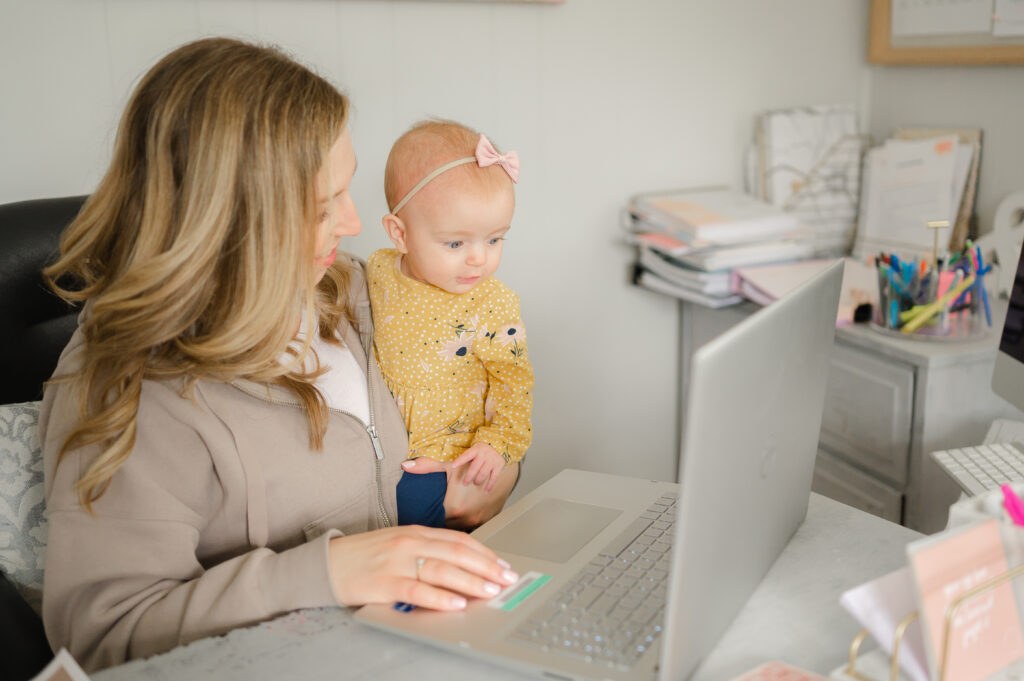
How to Financially Plan for a Maternity Leave (or Any Break) as a Small Business Owner

As business owners, there are times when we have to take a break. Whether that is for maternity leave, vacations, or anything in between. When this happens, you need a plan. We are going to dive into what I’ve done to financially plan for maternity leave. It’s pretty simple. That’s how I like things. It’s not super complex. I’m excited to bring you these tips for any type of break that you want to take in your business.
These tips are really great for any time that you want to take a break in your business. We all have those seasons where it’s summer break or Christmas break and our kids are home. Or we don’t work as much in a specific month. Maybe you have surgery coming up, are planning to have a baby, or even just in a slower season of business. Sometimes we need to have a bit more of a cushion and financially plan for how we’re going to get through those seasons. That’s what I’m going to talk about.
Rather than not paying yourself here are a few things that we can do when those seasons are upcoming and to financially plan for them.
My first recommendation is to have a general business savings emergency fund.
You’ve probably heard that term from good old Dave Ramsey. But I do really like this for business and I don’t necessarily have a set amount. I think that depends on different people’s personalities because some people like a little bit more cushion than others. If that sounds really intimidating to create an emergency fund, then just make it small. But a lot of people do like to have about three months’ worth of their business expenses.
If that sounds intimidating, just having a few hundred dollars set aside in case something comes up in your business can be really reassuring and comforting. In full transparency, I’m working on building mine back up, especially after having now to back to back babies. I have kind of burned through a lot of that savings. It’s currently pretty small, but I’m comfortable with that. But I am working this year to build it back up a little bit more so I have some cushion.
Sometimes this is nice when you are investing in things in business because you have a little more room to make those investments and pay in full potentially to save a little money. I’m not going to say don’t ever use it on things to invest in, but just having that little bit of a cushion in cash can be really helpful as a business owner. If you haven’t, start to build that emergency fund.
The first thing I did when I was thinking about maternity leave was to put myself on a spending freeze.
So for the past few months, I have not been spending or investing any money in my business. I have been focusing on saving up some amounts so that I can cover the expenses for when I’m out. Then it’s not as stressful to be able to pay myself. That is one thing you can definitely do is put yourself on a spending freeze. Just take a little pause and invest because you know you’re going to be out for a bit of time.
The next thing I did was check my list of recurring expenses.
If you have been around here for a minute, you’ve heard me talk about having a list of recurring expenses. It’s helpful to know and be able to plan for the certain expenses coming out, the dates, and the total amount. That’s how you know how much it takes to operate the business expense-wise. I re-evaluated that list of recurring expenses. I looked to see if there was anything that I could cut. This would be another great time to look at that list of recurring expenses. Is it all necessary? Is there anything you could pause? Are there any memberships that you could pause just for those few months while you’re out.
Smaller amounts of money because they really do add up when you accumulate them together. Look at things like any annual one-time charges that are going to be coming out? As I mentioned before, I like to try to pay for things in full or the annual plan when possible, because you usually save a little money doing it that way. When I did this to plan financially for maternity leave, I had a couple of extra things coming out that were a little bit larger amounts. I added that to my total to know how much to save for two months of recurring expenses plus the annual charges. This tells me how much I’ll need in my checking account during maternity leave.
If you don’t know that number, then check out my mini-course. We walked through exactly how to create that list of recurring expenses and the annual charges. And it’s really helpful to see it. All in one place. So check out my mini-course, linked in the show notes. If you need help creating that list.
I then made a plan for how I was going to save that money for two months of being out. I’m not fully planning to be away for that whole time. But financially plan that’s about how much I wanted to plan for. I know how much money my family needs for us just to survive for me to be paying myself. Again, if you don’t know that number, I encourage you to check out the mini-course. I was okay taking a slightly smaller paycheck for a few months to build up my reserve. And that’s okay.
I know that later this year I’ll be able to catch that up and pay myself a little bit more. There are also things that if I don’t get to, that’s okay because I want to invest and make some bigger investments at the end of the year if I have a little bit of the money left over that I didn’t pay myself as much.
These are the kinds of things that you have to know so that you can make financial plans. Otherwise, you won’t be paying yourself. It’ll be very sporadic and you won’t be able to make this kind of plan because you don’t even know how much it takes to run your business. That’s why this is really important.
I’ll probably do something very similar this summer because my kids will be home and I won’t have as much childcare, if any. I feel like a lot of times as business owners, especially as mom business owners, summer is kind of a slower season. Everybody’s just surviving summer or wanting to enjoy vacations and do camps with their kids or just special things. So it doesn’t seem like people are buying as much in the summer. I’ll probably financially plan in a similar way as I did for maternity leave.
One other thing is that the top priority for me was making sure that I had enough reserve to pay the two team members/contractors working with me currently. They are really going to be helping me and my business while I’m out. That was the top priority was to make sure that I had enough funds to be paying them.
That’s again, why I went through this plan of going on a spending freeze and double checking all my recurring expenses. I wanted to know what total cash I need to have in the bank when making a plan for how am I going to save up for those two months. Leading up to those months, I will be paying myself a little less, and over the next few months saving up those extra funds. All of that cash would be stored up and covered while I’m out. This just makes me feel way more at peace knowing I have cash in the bank, all the expenses are going to be covered, and my people are going to be paid.
Now I can just have that peace of mind that everything is going to run smoothly financially while I’m out. I hope those were helpful tips. Like I said, super simple, not very complex. But definitely, things that I like to do to financially plan in advance when I’m going to be taking a break or taking some time off of work.
For today’s demystifying financial jargon segment, we are going to be talking about the word audit. A lot of times when business owners hear the word audit, it sounds super scary. But it is not that way in all scenarios. When you hear about it from a small business perspective, it is typically when the IRS has chosen your tax return to review or audit. Basically, they are going to go through all the numbers, check your calculations, and ask you for a bunch of receipts and documentation for how you came up with those total numbers. That’s why it sounds a little scary as a business owner because that’s when it can be applicable to you is when the IRS is interested in how you came up with your calculations for your tax return.
But a whole other side of the word audit is something that is common for larger businesses. When I was in public accounting, we did audits all the time. Basically, if you are a business that is large enough to have stock and be on the exchange where you publicly trade those stock, then you are more than likely required to have an audit. That just means that a third party financial firm is going to come in. They will review all of your numbers, review all of your documentation, and ask for a lot of proof to make sure that those numbers are accurate. Every day, people are relying on the financial statements of those large organizations. So it is required for a third party to come in and audit that company.
A lot of times I hear audits are scary. That must mean they’re in trouble. But actually, a lot of people didn’t know that the bigger organizations are required to have that done every year. It’s very routine and standard. That is a little more information about that word, and how it applies to you as a business owner, but also larger corporations. Hopefully, you learn something new there.
Listen to this episode!